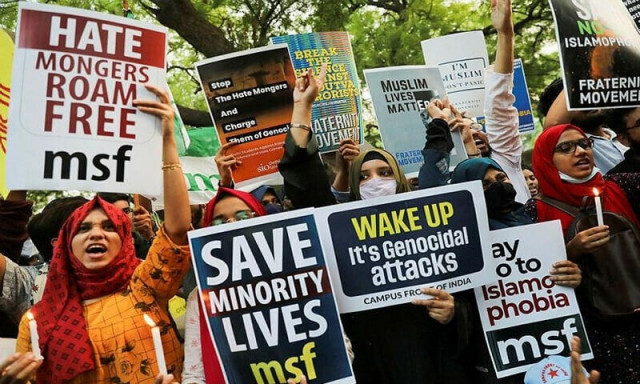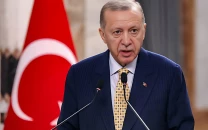Indian Republic Day masks democratic failures, minority persecution: Analysts
Ram Temple consecration and Kashmiri oppression expose India's Republic Day facade, marred by human rights abuses

Kashmiri leaders and human rights analysts view Indian Republic Day, observed on January 6, as a charade masking India's democratic shortcomings, exacerbated by the rise of the fanatical BJP regime.
The recent consecration of the Ram Temple in Ayodhya, coupled with ongoing persecution of minorities and human rights violations in the Indian Illegally Occupied Jammu and Kashmir (IIOJK), underscores the day as nothing more than a facade.
India's celebration of Republic Day is seen as a veiled attempt to conceal its oppressive actions, including gross human rights violations and the marginalisation of minorities.
Despite claims of being the world's largest democratic republic, Indian politics, particularly the BJP's ascent, has increasingly revolved around majoritarian Hindutva principles.
The emergence of the Hindu Nationalist BJP in 2014 and 2019 shattered the facade created by Gandhi and Nehru, exposing deep political fault lines and societal polarisation.
Read also: Amnesty calls for global action against rights violations in IIOJK
The BJP's efforts to saffronise the state have intensified divisions within Indian society, undermining its purported secular values.
Hindu nationalists assert that Indian identity is defined by Hindu culture, advocating for minorities to assimilate into this majority culture, contradicting India's professed secular values.
The recent controversy surrounding the inauguration of the Ram Mandir exemplifies India's exclusionary democratic tendencies, drawing criticism from political experts and analysts.
They highlight the psychological, physical, and economic persecution faced by minorities in India, including Dalits and Christians in Tamil Nadu, prompting significant conversions to Buddhism.
Read: US religious freedom watchdog 'implores' Biden administration to designate India
The recent controversy surrounding the inauguration of the Ram Mandir, constructed on the site of the historic Babri Masjid, exemplifies India's exclusionary democratic tendencies.
Analysts note that minorities, including Dalits and Christians in Tamil Nadu, endure severe human rights violations under BJP rule, leading to significant conversions to Buddhism.
In states like Manipur, where violence between different groups persists, India's federalism is deemed a failure, with allegations of covert BJP support for Hindu groups exacerbating tensions.
To denounce the mistreatment of minorities and the oppression of Kashmiri people, Kashmiri leaders have declared Indian Republic Day as a Black Day.
This action aims to underscore India's failure to grant Kashmiris the right to self-determination, contradicting its democratic principles.




1725099588-0/BeFunky-(41)1725099588-0-208x130.webp)














COMMENTS
Comments are moderated and generally will be posted if they are on-topic and not abusive.
For more information, please see our Comments FAQ